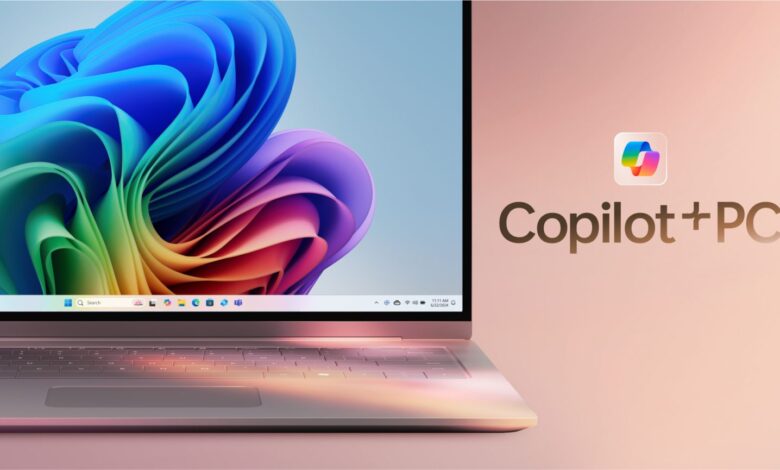Microsoft debuts Copilot+ PCs with range of AI and cybersecurity boosts

Microsoft Corp. today debuted Copilot+, a technical standard for personal computers optimized to run artificial intelligence models.
Executives detailed the specification at an event held on the premises of the company’s Redmond, Washington headquarters. They used the opportunity to preview the first PCs built based on the Copilot+ standard. All the new devices will ship with a Qualcomm Inc. processor, a second chip optimized to protect sensitive data and dozens of built-in AI models.
Hardware and security upgrades
Qualifying for the Copilot+ badge requires a PC to feature at least 16 gigabytes of RAM and a 256-gigabyte storage pool. More notably, hardware makers will have to equip their machines with an AI-optimized processing module. According to Microsoft, that module must provide over 40 TOPs of performance, which equals 40 trillion computations per second.
Alongside the AI accelerator, Copilot+ devices will have to feature a second specialized compute module: a so-called security processor. Its purpose is to prevent hackers from accessing sensitive data such as the encryption keys that protect a user’s files. Copilot+ PCs security processors will be based on a Microsoft-developed chip design known as Pluton.
“It helps protect credentials, identities, personal data, and encryption keys, making it significantly harder to remove, even if a cyberattacker installs malware or has physical possession of the PC,” David Weston, Microsoft’s vice president of enterprise and operating system security, wrote in a blog post.
A second set of cybersecurity enhancements will be implemented at the software level. According to Microsoft, devices with a Copilot+ badge will feature a hardened version of the Windows Hello biometric login method that is less susceptible to hacking. For added measure, the company is phasing out NTLM, a legacy Windows feature for processing user login requests that can lead to cybersecurity risks in certain situations.
AI-optimized PCs
Copilot+ devices will reportedly ship with more than 40 built-in AI algorithms. Some are so-called small language models developed by Microsoft with hardware efficiency in mind. Others are diffusion models, neural networks optimized for image generation tasks.
One of the features that the built-in AI algorithms will power is a new Windows capability called Recall. According to Microsoft, it allows users to more easily search for information across documents, webpages and applications. It’s joined by Cocreator, a set of AI-powered graphic design features designed to ease common image editing tasks.
The enhancements are rolling out alongside a dedicated app for Microsoft’s Copilot AI assistant. According to the company, the app will be powered by OpenAI’s latest GPT-4o large language model. The model is significantly better at processing multimodal input than its predecessor and features a more hardware-efficient architecture.
“Every Copilot+ PC comes with your personal powerful AI agent that is just a single tap away on keyboards with the new Copilot key,” Yusuf Mehdi, the Chief Marketing Officer of Microsoft’s consumer business, detailed in a blog post. “Copilot will now have the full application experience customers have been asking for in a streamlined, simple yet powerful and personal design.”
First-generation Copilot+ devices
The first Copilot+ PCs will become available on June 18 starting at $999. Most of the devices are made by major computer manufacturers such as Dell Technologies Inc., HP Inc. and Samsung Electronics Co. Ltd. They’re rolling out alongside two machines developed by Microsoft itself.
The cloud computing and software giant’s first Copilot+ device, the Surface Laptop, is powered by systems-on-chip from Qualcomm Inc.’s Snapdragon X processor lineup. The SOCs feature an onboard AI accelerator that provides 45 TOPS of performance. The Surface Laptop can be ordered in a 13.5-inch or 15-inch configuration with up to 64 gigabytes of RAM and 1 terabyte of flash storage.
The machine is rolling out alongside a new Copilot+ version of the Surface Pro, Microsoft’s two-in-one PC. It’s a 10.6-inch tablet that can be turned into a laptop with the help of a detachable keyboard. The Flex Keyboard, as the accessory is called, is also capable of connecting to the Surface Pro wirelessly and doubles as a stylus charger.
Like the Surface Laptop, the Surface Pro ships with a Snapdragon X processor from Qualcomm. Users may order the device with up to 32 gigabytes of RAM and one terabyte of storage. The top-end configurations also feature an OLED screen with higher display quality than the panel in the device’s standard edition.
Image: Microsoft
Your vote of support is important to us and it helps us keep the content FREE.
One click below supports our mission to provide free, deep, and relevant content.
Join our community on YouTube
Join the community that includes more than 15,000 #CubeAlumni experts, including Amazon.com CEO Andy Jassy, Dell Technologies founder and CEO Michael Dell, Intel CEO Pat Gelsinger, and many more luminaries and experts.
THANK YOU



